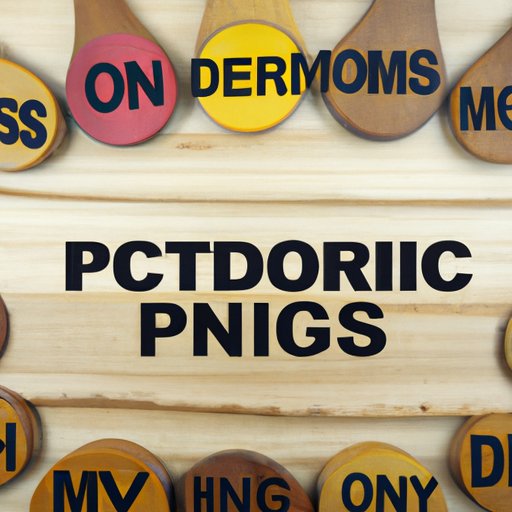
Introduction
Polycystic Ovary Syndrome (PCOS) is a hormonal disorder that affects approximately 1 in 10 women worldwide. It is a complex condition that can be frustrating and overwhelming to manage. The purpose of this article is to provide comprehensive information about PCOS, from its definition and symptoms to how to manage and cope with this condition.
Living with PCOS: A Comprehensive Guide to Understanding and Managing Polycystic Ovary Syndrome
PCOS is a hormonal disorder that affects the ovaries. The ovaries produce hormones that regulate the menstrual cycle, and in women with PCOS, the production of these hormones is disrupted. Symptoms can vary from person to person, but common symptoms include irregular periods, acne, weight gain, and excess hair growth.
Complications and risks associated with PCOS can be severe, including diabetes, high blood pressure, and endometrial cancer, making it essential to understand and manage this condition properly. Diagnosis and treatment options for PCOS include medications, lifestyle changes, and surgical procedures, depending on the severity of the condition.
Coping strategies for living with PCOS include stress management techniques, positive self-talk, and social support, among others. It is essential to remember that PCOS is manageable with proper care and treatment.

The Hormonal Rollercoaster: Navigating PCOS Symptoms and Treatment Options
PCOS is caused by hormonal imbalances, affecting multiple aspects of the body. Understanding these imbalances and managing their impact is crucial in mitigating the symptoms of PCOS. Common symptoms of PCOS often include acne, oily skin, hair loss, mood swings, and irregular periods, among numerous other symptoms.
Medications and supplements are commonly used in treating PCOS symptoms. Hormonal birth control, insulin-sensitizing agents, and anti-androgen medications are among the most common treatments prescribed by healthcare practitioners. Lifestyle changes can make a significant impact on PCOS management, including weight loss, regular exercise, and dietary changes.
How PCOS Affects Fertility and what you can do about it
PCOS can impact fertility as hormonal imbalances can affect the menstrual cycle, ovulation, and egg quality. Treatment options to address infertility caused by PCOS include ovulation induction medication, surgery, insemination, and in vitro fertilization (IVF). Pregnancy with PCOS is possible, and there are many tips and advice available to increase the chances of conceiving, including a healthy diet and lifestyle changes.
Debunking Common Myths about PCOS: Separating Fact from Fiction
There are many misconceptions surrounding PCOS that can sometimes lead to confusion and frustration for people living with this condition. Some common myths about PCOS include that it only affects overweight women or that PCOS is not a significant concern. Evidence-based facts can help correct misconceptions surrounding PCOS management.
Debunking false information about PCOS can be essential in helping people understand and manage this condition better. Healthcare practitioners and medical professionals can play a vital role in correcting these misconceptions and improving education and awareness surrounding PCOS.
5 Best Natural Remedies to Manage PCOS symptoms
Natural remedies for PCOS can be useful in managing symptoms and improving overall well-being. Benefits of using natural remedies compared to traditional medicine include fewer side effects, more affordable, and often readily available. Some of the best natural remedies for PCOS include apple cider vinegar, cinnamon, spearmint tea, and yoga, among others.
The Role of Diet and Exercise in Managing PCOS Symptoms
Diet and exercise can substantially manage the symptoms of PCOS. Research has shown that a low-carb diet can help regulate insulin levels and improve hormonal imbalances, leading to weight loss and improved symptoms. Exercise can also improve symptoms of PCOS and lower the risk of diabetes and high blood pressure.
PCOS and Mental Health: Understanding the link and Seeking Help
The hormonal imbalances affecting the body in PCOS can impact one’s mental health too. PCOS can cause depression, anxiety, and mood swings, among other mental health issues. It is essential to understand the link between PCOS and mental health and consult with professionals if necessary.
Seeking help for mental health concerns is essential in managing PCOS effectively. Mental health treatment may include counseling, medication, or a combination of both. Addressing mental health concerns can lead to a better overall quality of life.
Conclusion
PCOS is a complex condition that affects many aspects of the body’s functions. Understanding the symptoms, diagnosis, treatment options, and coping strategies are crucial for effective management. Healthcare practitioners and medical professionals play a significant role in educating the public about PCOS and debunking misconceptions surrounding this condition. By managing this condition well, people with PCOS can improve their overall quality of life.




